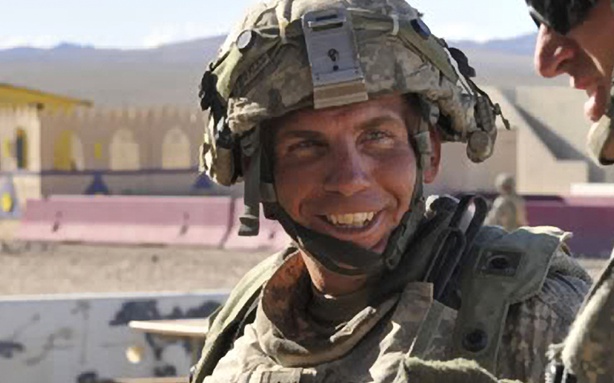 |
| It's a lot easier to call him evil, or mentally ill, than to acknowledge that we are each of us individually responsible for the acts of our soldiers overseas. |
GQ
"By the time [Kandahar massacre perpetrator Robert] Bales's combat career began, he already had a reputation as a preparation-obsessed soldier. But still, he was shocked by the visceral anarchy of war.
“The first time you engage, I hate to say it, but you kind of spray [bullets] everywhere because you're scared, you're hyped up, it's for real,” Bales says, recalling the first significant battle of his first tour, a firefight in Mosul. “Later on, that goes away. You start to control your breathing, start to calm down. You know what you're looking at and what's going on. You've been there. You've done it. But your first firefight is a pretty big deal.”
Kari picked him up at the airport, and they went straight to a Seahawks game. Five months later, they were married. But even though Bales was home now, and safe, he barely scaled back his intensity. Powered by a half-dozen sugar-free Red Bulls a day, he worked life-consuming hours, rising at 4:30 A.M. to beat the traffic and sometimes not returning home until 9 or 10 at night. He knew he'd be deploying again and was focused on making sure his men were prepared.
He was also showing signs of paranoia, though Kari didn't fully perceive it yet. She had a habit of waking up from nightmares, fearful that someone was in the house. When this happened, Bales would get out of bed and perform a full patrol of the home—clearing every room, checking every closet—then go outside and lap the perimeter. Kari thought nothing of it, at least not then: “I just thought, ‘Oh, that's just part of loving a soldier. He's taking care of his family.’ ”
Bales's boozing was another thing that, at first, didn't strike Kari as a reaction to his job. Though he got an open-container citation in 2005 and rolled his Mustang after a night out with the boys a few years later, his drinking often seemed fun and social, a hardworking soldier cutting loose. Other times it was a more brooding act.
“He would go out and sit on the deck and have a cigar, because that was something they did in Iraq,” Kari says. “He'd listen to his music—Metallica when he was feeling dark—and you knew that he was dealing with all that he had seen. I'd go out there sometimes, but he liked to be alone. You could just tell that he was dealing with things that were...dark things. He didn't really open up a whole lot about those things.”
...
It wasn't until after his third tour, a relatively quiet stint in a comparatively peaceful Iraq, that Bales finally admitted he needed help. The drinking, the paranoia, and the sleeping problems (three hours a night was not unusual) were all getting worse, and now there were some new problems: terrible headaches and an increasingly explosive temper. In the summer of 2010, he went to an Army doctor about the headaches. The doctor diagnosed Bales with mild traumatic brain injury (almost certainly from repeated exposure to IEDs, but possibly going all the way back to his high-school-football days) and also found clear symptoms of PTSD. Bales, like many soldiers, had always believed PTSD was, as he told me, “an excuse to be a coward,” a cop-out for weak men who lacked the stomach and heart for the real work of war. But he agreed to meet with a therapist, mainly because he wanted to ensure treatment for his headaches. That didn't last. “After a few sessions, I thought it wasn't helping, because he just kept telling me my anger was a mask for another emotion,” Bales wrote in a letter to an Army judge this past February. “What emotion! The only thing I felt was weak, talking about my emotions. Where I am from, men don't talk like that. I told the PTSD doctor I was doing better, and he let me stop coming.”
None of this stopped the Army from redeploying him to Afghanistan a year and a half later."
http://www.spiegel.de/international/the-nazi-death-machine-hitler-s-drugged-soldiers-a-354606.html
ReplyDelete